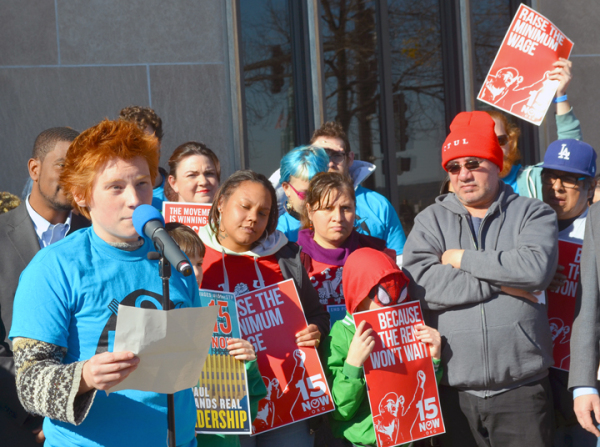

Share
It felt like a victory celebration as working people and their families rallied with elected officials outside City Hall Wednesday, just minutes before council members formally introduced an ordinance that would put St. Paul on track to a $15 minimum wage.
The finish line may be in sight, but Mayor Melvin Carter had a warning for supporters.
“We’re not done yet,” he said, listing the procedural hurdles and public hearings the ordinance faces before it can receive a vote. “But I’ve committed myself and our city to passing this into law by the end of the year, and I remain committed. And I want to say thank you to all of you for being engaged.”
Carter was speaking to union members, tipped workers and other low-wage workers who have been pushing for action in St. Paul since Minneapolis adopted its ordinance over a year ago. At the rally, they stood together in support of the proposed ordinance, unveiled a week earlier by Mayor Carter.

Co-authored by five of the council’s seven members (Amy Brendmoen, Mitra Jalali Nelson, Rebecca Noecker, Dai Thao and Chris Tolbert), the ordinance closely mirrors recommendations of a task force that spent more than three months studying the potential effects of a wage hike and listening to workers, business owners and others who would be impacted by the ordinance.
“We have been listening, talking, debating and voting for almost a year now,” said SEIU Healthcare Minnesota Political Director Rick Varco, who co-chaired the task force. “Now is the time to act.”
Action by the council would raise wages for an estimated 56,000 people – nearly a third of the city’s workforce – who earn less than $15 an hour.
Rosalio Vences, a janitor at a Target store in St. Paul, is among them. The cleaning contractor he works for has raised his pay just once – from $11 to $11.25 per hour – in the nearly three years Vences has been on the job. Lately, he said, the boss has been cutting hours off his scheduled shifts, too.
“But they always give us a raise in workload,” Vences said. “We always have more work to do, faster and faster.”
With the extra money he’d be earning with a $15 minimum wage, Vences could afford to move out of the room he rents in someone else’s home and get his own place. “With our current wages, we can’t afford to pay our rent and our bills,” he said.
Servers like Erin Lynch also praised the proposed ordinance, which would not carve out a lower wage for workers who earn tips. The question of whether to include a so-called “tip adjustment” has been a focus of debate, but Lynch said earning a livable wage makes servers more likely to stand up to harassment from customers and managers who “wave the prospect of a tip over your head.”
Restaurant workers experience sexual harassment on the job more frequently than workers in any other industry. A 2014 report by the Restaurant Opportunities Center United found 9 of 10 women working in the industry had experienced sexual harassment on the job, and so had 7 of 10 men. Sexual harassment is more prevalent, the report found, in states that allow servers and bartenders to be paid less than minimum wage.
“It’s really demoralizing that me and my coworkers have to put up with this stuff every day, to varying amounts,” Lynch said. “A $15 an hour minimum wage would alleviate this and would lessen my dependence on tips. It puts me in a better position to stand up for my dignity.”
The ordinance, as currently drafted, would take effect in 2020, and would affect employers differently based on their size.
Large businesses – those with more than 100 workers – would be required to pay $15 per hour by July 1, 2023. Workers at small businesses would reach $15 by July 1, 2026. Microbusinesses – those with five or fewer employees – would have two more years to phase in the full minimum wage, which would adjust annually for inflation.
The ordinance also would put the city’s own employees on track to earn $15 by July 1, 2022.
The Met Council’s most recent analysis of census data shows 40.8 percent of St. Paul residents live in poverty, a higher rate than any other metro-area community.
“We’re so grateful to the mayor for having listened to our words to help bring change with our employers,” Vences, a member of the Twin Cities worker center CTUL, said. “For so long we’ve been lifting our voices to say we need a raise to $15 an hour.”

